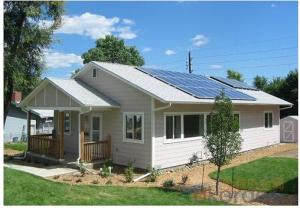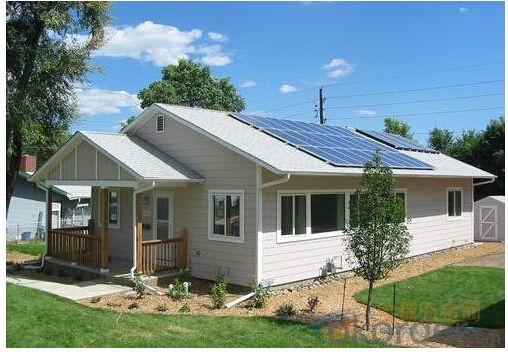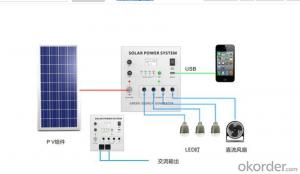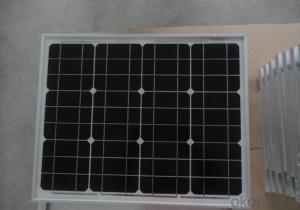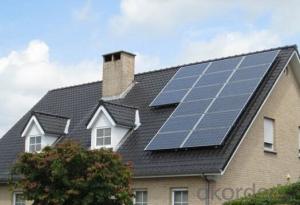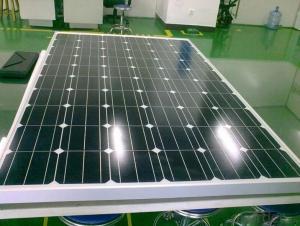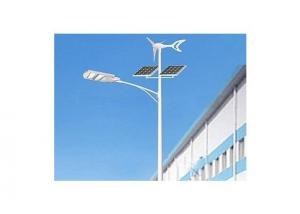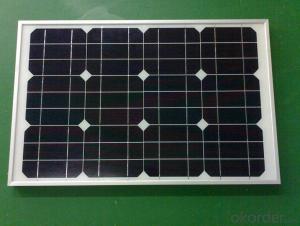Solid Solar Energy Systems - 300W Solar System Made in China
- Loading Port:
- China Main Port
- Payment Terms:
- TT OR LC
- Min Order Qty:
- -
- Supply Capability:
- -
OKorder Service Pledge
Quality Product, Order Online Tracking, Timely Delivery
OKorder Financial Service
Credit Rating, Credit Services, Credit Purchasing
You Might Also Like
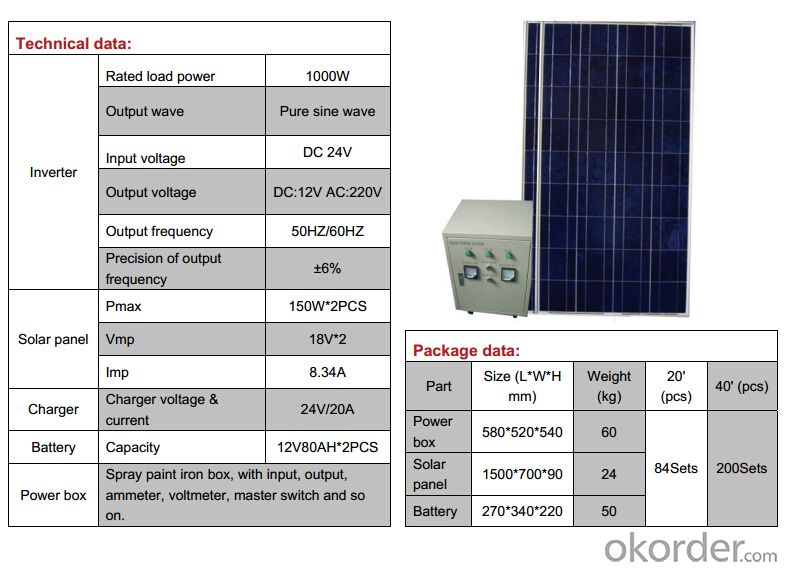
- Q: Can solar energy systems be used during a power outage?
- Yes, solar energy systems can be used during a power outage as long as they are equipped with battery storage. This allows the stored solar energy to be used as a backup power source when the grid is down.
- Q: Can solar energy systems be used in areas with high levels of wildlife activity?
- Yes, solar energy systems can be used in areas with high levels of wildlife activity. While it is true that wildlife can pose some challenges for solar energy systems, there are several ways to mitigate these issues. One of the primary concerns is the risk of damage to the solar panels by large animals or birds. However, there are various protective measures that can be taken to prevent this. For instance, installing fencing or barriers around the solar panels can help keep wildlife away. Additionally, using anti-reflective coatings on the panels can reduce the likelihood of bird collisions. Another concern is the impact of solar energy systems on wildlife habitats. It is crucial to choose the location of the solar panels carefully, considering the existing wildlife activity in the area. By conducting thorough environmental impact assessments and engaging with local wildlife experts, it is possible to minimize any potential negative effects on wildlife habitats. Moreover, solar energy systems can actually benefit wildlife in some cases. For example, solar farms can provide additional shelter and shade for some species, and the open spaces underneath the panels can create new habitats for ground-dwelling animals. Overall, while there may be some challenges, with proper planning and mitigation strategies, solar energy systems can be successfully utilized in areas with high levels of wildlife activity.
- Q: What is the role of maximum power point tracking (MPPT) in solar energy systems?
- The role of maximum power point tracking (MPPT) in solar energy systems is to maximize the efficiency and output of the solar panels. MPPT algorithms continuously monitor and adjust the operating point of the solar panels to ensure that they are always operating at their maximum power point, where the panel's output is optimized. This helps to extract the maximum amount of energy from the solar panels, increasing the overall efficiency of the system and maximizing the power generation potential of the solar energy system.
- Q: Can solar energy systems be integrated into existing electrical systems?
- Yes, solar energy systems can be integrated into existing electrical systems. These systems can be designed to work alongside traditional electricity sources, allowing solar energy to supplement or replace grid power. Integration typically involves installing solar panels, inverters, and a connection to the existing electrical system. This integration enables the seamless use of solar power and helps reduce reliance on fossil fuels.
- Q: Can solar energy systems be used in areas with strict building codes or homeowner association restrictions?
- Yes, solar energy systems can be used in areas with strict building codes or homeowner association restrictions. However, it may require careful planning and adherence to specific guidelines. In such cases, homeowners or developers would need to work closely with relevant authorities to ensure compliance with regulations while incorporating solar energy systems into the building design.
- Q: Can a solar energy system be installed in areas with extreme weather conditions?
- Indeed, solar energy systems have the capability of being installed in regions that experience severe weather conditions. These systems are specifically constructed to endure a broad spectrum of weather phenomena, including extreme cold, heat, wind, rain, and snow. In fact, solar panels are frequently utilized in diverse areas with intense weather conditions, such as deserts, arctic regions, and coastal zones. To guarantee the sturdiness and effectiveness of the system, solar panels are constructed using top-notch materials that possess the ability to withstand adverse weather conditions. They are designed to be resistant to impact and undergo rigorous testing to ensure they can endure hail, strong winds, and heavy snow loads. Furthermore, the frames and mounting systems employed for solar panels are engineered to provide stability and protection against extreme weather events. Even in frigid weather conditions, solar energy systems can still function efficiently, although their performance may be slightly affected by the lower temperatures. Solar panels are specifically designed to absorb sunlight, enabling them to generate electricity even under low-light circumstances. In snowy areas, solar panels are typically installed at an angle to facilitate the shedding of snow and prevent accumulation that could reduce their efficiency. In regions with scorching heat, solar energy systems can still operate effectively, albeit with a slight reduction in panel efficiency due to elevated temperatures. Nevertheless, contemporary solar panels are equipped with heat dissipation features to minimize any performance losses caused by high temperatures. In summary, solar energy systems possess remarkable adaptability and can be successfully installed in areas that experience extreme weather conditions. They are designed to withstand a wide range of weather elements, ensuring the generation of clean and renewable energy persists even in challenging environments.
- Q: How does the cleanliness of solar panels affect energy production?
- The cleanliness of solar panels plays a crucial role in the efficiency and energy production of solar systems. When solar panels are dirty or covered with dust, debris, or other contaminants, it significantly reduces their ability to convert sunlight into electricity. Dirt, dust, and pollutants on the surface of solar panels act as a barrier to sunlight, preventing a significant amount of light from reaching the solar cells underneath. This obstruction hinders the panels' ability to absorb and convert the sunlight into usable energy. Consequently, the energy production of the solar system decreases. Additionally, when solar panels are dirty, they may experience a phenomenon known as the "soiling effect." This effect occurs when the accumulation of dirt and dust particles on the panel's surface causes a decrease in the overall performance of the solar cells. The soiling effect can be particularly impactful in areas with high levels of air pollution or in regions prone to dust storms. Regular cleaning and maintenance of solar panels are essential to ensure optimal energy production. By keeping solar panels clean and free from debris, the amount of sunlight that reaches the solar cells is maximized, resulting in higher energy output. Studies have shown that even a thin layer of dirt can reduce the efficiency of solar panels by up to 20%. Furthermore, the angle and orientation of solar panels also influence their cleanliness and energy production. Panels that are installed at a steeper angle or have a self-cleaning mechanism, such as rainwater runoff, are less prone to dirt accumulation and therefore can maintain higher energy production levels. In conclusion, the cleanliness of solar panels directly impacts their energy production. Regular cleaning and maintenance are necessary to ensure that solar panels can effectively absorb sunlight and convert it into electricity. By keeping the panels clean, their efficiency and overall energy output can be maximized, leading to more cost-effective and sustainable energy generation.
- Q: Can solar energy systems be leased or financed?
- Yes, solar energy systems can be leased or financed. Many companies offer lease or financing options for installing solar panels on residential or commercial properties. These options allow individuals or businesses to enjoy the benefits of solar energy without the high upfront costs of purchasing and installing the system.
- Q: Can solar energy systems be used for powering electric vehicle component manufacturing plants?
- Yes, solar energy systems can definitely be used for powering electric vehicle component manufacturing plants. Solar energy is a renewable and sustainable source of power that can provide a significant amount of electricity needed for various industrial processes. By installing solar panels on the rooftops or open spaces around the manufacturing plant, the facility can generate clean and emission-free electricity, reducing its reliance on traditional energy sources. Solar energy systems have the capacity to generate a substantial amount of electricity, especially when combined with advanced technologies such as concentrated solar power or solar tracking systems. These systems can efficiently harness sunlight and convert it into electricity, providing a reliable and consistent source of power for the manufacturing plant. Additionally, electric vehicle component manufacturing plants often require a significant amount of energy for various processes, such as machining, welding, and assembly. By utilizing solar energy, these plants can not only meet their electricity needs but also reduce their operational costs and carbon footprint. Solar power can help in achieving sustainability goals and contribute to a cleaner and greener manufacturing process. Moreover, the use of solar energy systems in electric vehicle component manufacturing plants can serve as a positive marketing tool. As the demand for electric vehicles and sustainable manufacturing practices continues to rise, consumers are increasingly drawn towards companies that actively promote renewable energy. By powering their manufacturing plants with solar energy, companies can showcase their commitment to environmental stewardship and attract environmentally conscious customers. In conclusion, solar energy systems can indeed be utilized to power electric vehicle component manufacturing plants. With their ability to generate clean, reliable, and cost-effective electricity, solar power can play a crucial role in meeting the energy needs of these plants while promoting sustainability and reducing environmental impact.
- Q: I usually have to use about 10 degrees, more in the summer! Winter sunshine time 10 hours! Who knows how much a set price, what brand?
- General installation 3000W on the line, a full set of system down 21 thousand yuan. Print-Rite used solar panels, inverter with crystal fuyuan. Guilin Jinyang PV is so safe.
Send your message to us
Solid Solar Energy Systems - 300W Solar System Made in China
- Loading Port:
- China Main Port
- Payment Terms:
- TT OR LC
- Min Order Qty:
- -
- Supply Capability:
- -
OKorder Service Pledge
Quality Product, Order Online Tracking, Timely Delivery
OKorder Financial Service
Credit Rating, Credit Services, Credit Purchasing
Similar products
Hot products
Hot Searches
Related keywords
